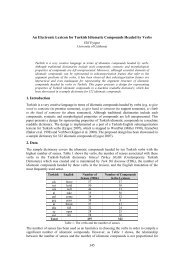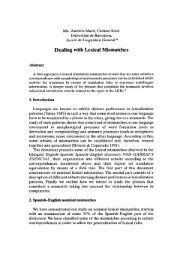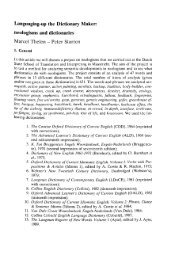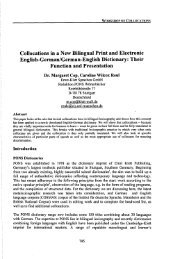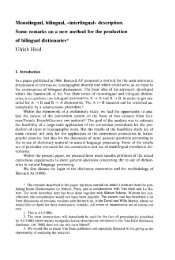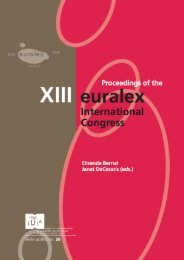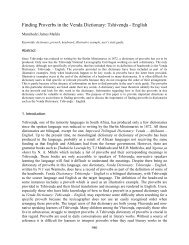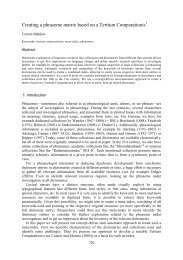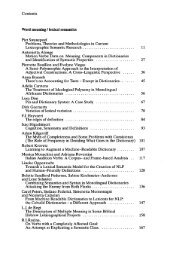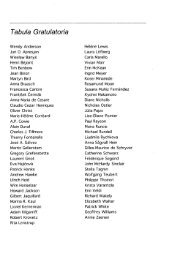Download pdf - Euralex
Download pdf - Euralex
Download pdf - Euralex
You also want an ePaper? Increase the reach of your titles
YUMPU automatically turns print PDFs into web optimized ePapers that Google loves.
8. Results<br />
The accuracy rates at which the participants accomplished the dictionary consultation tasks using<br />
the different dictionaries were comparable, with an overall accuracy rate of 72.3% for all the<br />
three tasks for CALD3, an overall accuracy rate of 71.2% for COBUILD and an overall accuracy<br />
rate of 71.8% for LDOCE5. When individual tasks were analyzed, the accuracy rates were also<br />
comparable: For the Meaning Determination Task, the accuracy rates for CALD3, COBUILD<br />
and LDOCE5 were 64.4%, 65.7%, and 50.5%, for the Sentence Completion Task, the accuracy<br />
rates were 74.5%, 73%, and 79%, and for the Sentence Construction Task, the accuracy rates<br />
were 76.4%, 75% and 84.5% respectively. Despite these comparable figures, a number of<br />
participants (a total of four) using LDOCE5 achieved a very low accuracy rate of 40% or below.<br />
This pattern was not found in the performance of any participants using the other two dictionaries.<br />
The majority of the participants relied on and made explicit reference to the definitions<br />
and examples in the dictionaries for completing the language comprehension and production<br />
tasks. Although different special features (e.g. bold, capitals, special symbols) were used in the<br />
different dictionaries, only a minority of these features were made explicit reference to in the<br />
participants’ dictionary consultations. A detailed analysis of the introspective written<br />
questionnaires and the think-aloud verbal reports revealed that only 1.5% of the dictionary<br />
consultations made reference to the use of boldface in CALD3, 2.5 % to that in COBUILD, and<br />
11.9% to that in LDOCE5. 8% of the consultations made reference to the use of capitals in<br />
CALD3, 0% to that in COBUILD, and 1% to that in LDOCE5. 0% of the consultations made<br />
reference to the use of special symbols in CADL3 and COBUILD, whereas 5.5% made reference<br />
to that in LDOCE5.<br />
Examples of reference making to boldface included reports such as “Just now the second phrasal<br />
verb frighten away are in bold (Sentence Completion, dictionary used: LDOCE5)”, examples of<br />
reference making to capitals included the words in capitals given by different participants in<br />
explaining the information which led them to the decisions, and examples of reference making to<br />
special symbols included reports such as “ (caution) Do not say that something ‘comprise of’<br />
things or people. (Sentence Construction, dictionary used: LDOCE5).<br />
Also a minority of the participants were not satisfied with the information included in the<br />
different dictionaries and complained about the lack of information or their unclear presentations.<br />
0.5% of the dictionary consultations using CALD3, 2% using COBUILD and 0.5% using<br />
LDOCE5 included explicit verbal/written complaints by the participants. Examples of complaints<br />
included reports such as “Actually there is no example of this usage in the entry, I have to guess<br />
whether I should use of or for after monument in the task (Sentence Completion, dictionary used:<br />
COBUILD)”.<br />
Regarding the overall usefulness of the dictionaries used, 81.8%, 80% and 63.6% of the<br />
participants found CALD3, COBUILD and LDOCE5 extremely useful or very useful. While no<br />
participants regarded CALD3 and LDOCE5 not very useful or not useful at all, 20% of those<br />
using COBUILD had that feeling. 68.9% and 68% of the participants using CALD3 and<br />
COBUILD were sure that their decisions were correct, but a higher proportion of 83.6% of those<br />
using LDOCE5 were sure about their decisions.<br />
609



